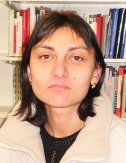Studying Romani in Manchester
PhD Projects in Romani Linguistics
- My research focuses on constructions of home among multilingual Roma in Prizren, Kosovo.
Four languages are generally spoken in Prizren, three officially (Albanian, Serbian/Bosnian, and Turkish) as well as Romani unofficially. Due to traditional ethnic hierarchies, Roma tend to be the most multilingual, speaking all four of these languages. Prizren is of particular interest in that despite the war, which has meant that many areas are now mono-ethnic and monolingual, it has remained relatively mixed.
My work is situated between social anthropology and linguistics, and I intend to looks at patterns of speech and language use in multilingual contexts. In particular my research will focus on constructions of home and belonging in relation the use of different languages. This will involve addressing the contextual nature of language use and language choice.

Romani language and identity on the Internet
Funding: RICC (Research Institute for Cosmopolitan Cultures)- By documenting how Romani is used on-line by a diasporic community, I investigate the relationship between language and identity in virtual spaces. The textual nature of on-line communication also makes possible to examine the spontaneous language codification effort pursued by Roma. The research shows how cosmopolitan practices and the flexibility of the medium itself make possible for a bottom-up approach to language codification. This findings calls for a rethinking of our current theories on language standardization and linguistic human rights, pointing at the feasibility of a policy of linguistic pluralism.

The structure of verbs in Romani
Funding: AHRB (Arts and Humanities Research Board)- The thesis examines the typology of derivational formations in Romani verbs, paying special attention to inter-dialectal variation and semantic mapping in the function of valency markers, such as ‑av‑, ‑ar‑, and ‑ker‑, the susceptibility of functional change to convergence with the contact languages, and the interplay between valency markers and aspect, aktionsart, and the adaptation of loan verbs from contact languages.

The Northeastern Romani dialect group
Funding: ORS (Overseas Research Students)- The aims of this project are to examine some of the hitherto undescribed or only partly described varieties belonging to this group (also known as ‘Baltic’ Romani), such as Lithuanian Romani and the Polska Roma dialect, to outline shared features of this dialect group and determine its historical and dialectological position within Romani as a whole, and to examine contact developments in the dialects belonging to the group, and make a theoretical contribution to the study of language convergence, grammatical borrowing and contact-induced grammaticalisation.

The Romani variety of Sofades (Karditsa, Greece)- The Sofades variety is a conservative dialect of Romani spoken in central Greece. The thesis will provide a grammatical description of this variety, part of a group of Romani dialects that have so far attracted little attention, yet might be assumed to have existed in this location since the Byzantine period, constantly under Greek influence. Special attention is given to the various layers of grammatical borrowing from Greek, and to sociolinguistic dimensions such as language attitudes and domains of use.

The Romani dialects of Bulgaria
Funding: OSI (Open Society Institute)- Bulgaria has arguably the biggest diversity of Romani dialects, all within a rather dense area. The project is based on extensive fieldwork, much of it carried out already as part of the Dialect Survey supporting the Romani-Morphosyntax (RMS) Database project, in 2002-2003. During this period, questionnaire elicitations were carried out throughout Bulgaria, documenting the different types of Romani dialects in the country. The project will assess the structural variation among these varieties, and attempt to map the various layers of Romani speech in Bulgaria.

